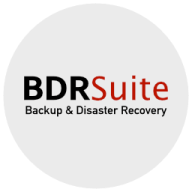

BDRSuite Backup & Replication and Acronis Disaster Recovery compete in the backup and disaster recovery software category. While BDRSuite stands out for its user-friendly interface and pricing, Acronis is recognized for extensive disaster recovery features, appealing to varied user needs.
Features: BDRSuite is known for its ease of use, support for VMware and Hyper-V, and competitive pricing. Its backup options are flexible, catering to user needs effectively. Acronis Disaster Recovery shines with its robust disaster recovery capabilities, providing efficient backup and recovery functionalities, ensuring data protection and quick recovery processes.
Room for Improvement: BDRSuite can improve support response times and simplifying setup, particularly with agent management. Enhancing customer service and documentation clarity is advised. Acronis users request advanced features like real-time backup and expanded cross-platform support, alongside bolstering customer service for improved reliability.
Ease of Deployment and Customer Service: BDRSuite offers on-premises deployment, favorable for environments needing direct control, with praised support despite some time zone issues. Acronis provides flexible deployment across public cloud and hybrid settings, though feedback on customer service is mixed, with some delays noted, highlighting areas for support improvement.
Pricing and ROI: BDRSuite presents varied and affordable pricing models, advantageous for businesses of all sizes, yielding significant ROI, especially for budget-concerned users. In contrast, Acronis is positioned as a reasonable enterprise solution, albeit considered costly compared to alternatives, with its comprehensive features underlying the expense for extensive disaster recovery solutions.
My customers are finding value in Acronis Disaster Recovery, as they are happy with the tool and continue to use the services after facing many situations where they found it useful and got good returns on their investment.
Acronis regularly introduces new features to meet customer needs, which can lead to efficiencies.
A high-level technical team should be accessible swiftly to minimize customer downtime.
They were experts regarding Acronis support for any kind of issues.
We face issues connecting with the account manager, which needs to be improved.
Not needing technical support is even better than good technical support.
It is easy to scale; you can directly add licenses for scalability.
The scalability of Acronis Disaster Recovery is good, and I would rate it an eight out of ten.
We have not experienced any downtime, bugs, or glitches.
For the backup to compete in the enterprise market, there must be improvements.
If a server is completely offline and destroyed, the system should offer an intelligent response, providing options to start recovery without requiring manual intervention from engineers.
They could also enhance endpoint security by integrating EDR within the security framework.
There could always be little things that could still be fixed or improved for stability.
The price for Acronis Disaster Recovery is fair from the perspective of features, but for Indian customers and in light of the competition, it would be better if the price were a little lower to pitch services more effectively.
Acronis Disaster Recovery is fairly priced.
The pricing for Acronis products has increased by 10% to 15% over the past few years, making it challenging for existing customers to accommodate the rising costs annually.
For data recovery, when we lose a server, we are able to restore it in place with the click of a button.
The ability to automate the backup solution and recover entire mailboxes or even granular-level emails is very good for restoration and backup.
With the help of Acronis Disaster Recovery automation, we helped them to recover data multiple times in accidental deletion cases, making it a very useful tool for them.
The features I find most valuable are ease of backup, ease of restore, the full restore, just getting some data out of a backup server or even the applications that are in the server, going through the database or going to Exchange.
| Product | Market Share (%) |
|---|---|
| BDRSuite Backup & Replication | 1.7% |
| Acronis Disaster Recovery | 0.4% |
| Other | 97.9% |


| Company Size | Count |
|---|---|
| Small Business | 13 |
| Midsize Enterprise | 1 |
| Large Enterprise | 3 |
| Company Size | Count |
|---|---|
| Small Business | 44 |
| Midsize Enterprise | 15 |
| Large Enterprise | 10 |
Acronis Disaster Recovery Service is a hybrid cloud, all-in-one, IT continuity solution that protects and restores your data and servers in the event of a natural or man-made disaster. Leveraging the power of the Acronis AnyData Engine, Acronis Disaster Recovery Service can reliably recover your servers or entire data centers without the need for you to invest in duplicate systems or additional staff.
Acronis Disaster Recovery Service can reliably recover your servers or entire data centers without the need for your organization to invest in duplicate systems or additional staff. Providing flexible recovery time objective (RTO) options, Acronis Disaster Recovery Service combines the high performance and shortest recovery time of a local appliance with the low cost, predictability, and accessibility of a virtual private cloud.
BDRSuite by Vembu offers comprehensive and cost-effective Backup and Disaster Recovery software tailored to meet the diverse data protection requirements of Businesses and Service Providers. BDRSuite provides robust backup solutions for a wide range of IT workloads, including virtual machines, servers, endpoints, SaaS applications, cloud VMs, NAS/File Shares, and databases & applications. It offers the flexibility to store backups anywhere and centrally manage the entire backup infrastructure.
BDRSuite is designed to help businesses keep their data secure and ensure it is easily recoverable in the event of data loss or ransomware attacks. With BDRSuite, businesses can achieve reliable data protection and ensure business continuity – all at an affordable price.
Download BDRSuite's 30-day Free Trial Here.
PRICING DETAILS
VMs, Servers & Cloud Backup at $48 per workload/year (VMware, Hyper-V, KVM, oVirt, Proxmox, Windows, Linux, AWS, Azure, File Share-500 GB)
Endpoint/Workstation Backup at $12 per endpoint/year (Windows, Linux, Mac)
SaaS Backup at $12 per user/year (Microsoft 365, Google Workspace)
DBs & Applications Backup at $72 per application/year (SQL Server, PostgreSQL, MySQL, Microsoft Exchange Server, SharePoint Server)
We monitor all Disaster Recovery (DR) Software reviews to prevent fraudulent reviews and keep review quality high. We do not post reviews by company employees or direct competitors. We validate each review for authenticity via cross-reference with LinkedIn, and personal follow-up with the reviewer when necessary.